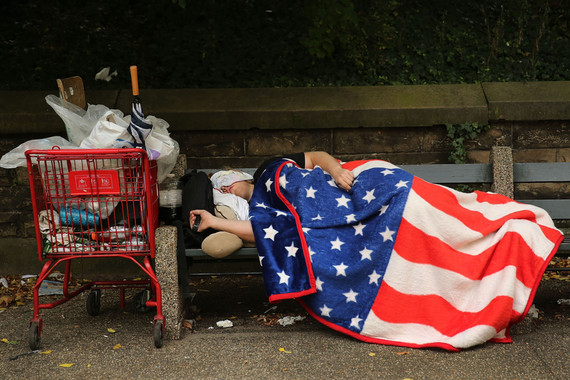Last week, President Obama addressed an audience of religious leaders, policymakers, researchers and community organizers when he spoke as a panelist at the Catholic-Evangelical Leadership Summit on Overcoming Poverty.
The event was held in Georgetown, one of the wealthiest communities in America.
I am as pleased as the next person to see our President's concern for poverty extend beyond preaching personal responsibility to African Americans. It was also good to know that the President, E.J. Dionne, Jr. (panel moderator), and panelists Robert Putnam (Harvard professor) and Arthur Brooks (president of the American Enterprise Institute) all agreed that government has a role to play in reducing poverty. But which strategies should be employed and how much money should be allocated to this issue? Well, there's the rub. 
It has been half a century since President Lyndon Johnson launched his War on Poverty. While the effectiveness of this program is debatable, there can be no question that poverty remains a serious and intractable social issue in America.
According to the United States Census Bureau:
•There are over 45 million people in poverty. The poverty rate is 14.5 percent, down only 8 percent since 1959 and close to the largest number of people in poverty in the 52 years for which statistics have been published;
•Nearly 15 million or 20 percent of children under 18 live in poverty. Children represent 23.5 percent of the total population, but they are over 32 percent of people in poverty.
•20 million Americans or 44 percent of the poor live in extreme poverty, with annual incomes of $10,000 or less for a family of four.
Behind these statistics are real people unable to provide the bare necessities of life for themselves and their families.
In my former work as a social justice activist, I led an organization working for drug policy reform, an issue not unrelated to poverty. In her brilliant book, The New Jim Crow, Michelle Alexander writes about how poor people of color have been targeted for the enforcement of our drug laws, despite the fact that all races use and sell illegal drugs at remarkably similar rates. In a justice system predicated on the ability to pay, this leaves those least able to lawyer up and defend themselves at a decided disadvantage. The drug war is the single greatest contributor to mass incarceration and contributes substantially to high unemployment and absent fathers. All of which have a causal relationship with poverty.
Given this reality, you might think activists and faith-based organizations concerned about poverty, like those convened last week in Georgetown, would be a major force for drug policy reform. You would be wrong.
Many who want to "overcome" poverty are indifferent to--and may even oppose--changing drug laws and policies that target poor communities and relegate permanently people of color to the underclass.
Western thought is thoroughly ensconced in compartmentalization. All too often, those working for social change find themselves constricted by academic, religious or political silos, which can undermine creative problem solving.
I believe poverty, like a whole host of other intractable social ills, is really a spiritual problem. Rarely, however, are social issues discussed in a spiritual context, but I believe this is the proper and essential framework.
Spiritual awareness is a state of being. It is not a religion.
Spiritual awareness is a state of consciousness wherein the connection to the Source of all life and all of creation is acknowledged and embraced. This awareness informs thought and action. This kind of awareness eschews negative and stigmatizing labels, self-serving agendas and self-righteousness.
Jim Wallis, the President's spiritual advisor, wrote in his book, Faith Works:
"I believe the making of the modern Christian, Jew or Muslim will be through action. When put into action, faith has the capacity to bring people together, to motivate, and to inspire, even across former dividing lines."
It is true that action is necessary, if change is to occur. However, unless that action is undertaken by spiritually enlightened actors, then nothing transformative can result.
Spiritual awareness must precede action.
Like secularists, religious people bring in tow their attitudes about race, class and the "other" as they go about their work.
In a state of spiritual unconsciousness, we identify with and are controlled by a mind-created sense of self, our ego. What I want I have no problem taking from you. I am perennially insecure and fearful. And no matter how much I gain, my wanting will never be satiated.
I believe that social ills like poverty are the result of spiritual unconsciousness. Through our unconsciousness, each of us has unwittingly contributed to poverty in America with our indifference, ignorance or unhelpful actions.
We are all poorer because of the 45 million people who live in poverty. It is possible to change this picture, but first we must change our consciousness.